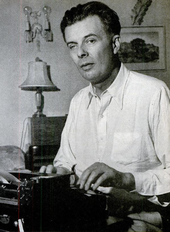Aldous Huxley

Aldous Leonard Huxley [ˈɔːldəs ˈhʌksli] (b. 26 July 1894 in Godalming, Surrey (England); † 22 November 1963 in Los Angeles) was a British writer. Huxley became famous mainly for novels and numerous essays. However, he also published short stories, poetry, travelogues, and wrote screenplays. His best-known work is the dystopian novel Brave New World, published in 1932. Huxley was repeatedly called a polymath and is considered one of the most outstanding intellectuals of his time.
Huxley came from the prominent Huxley family. From 1913 to 1916, Huxley studied English literature at Balliol College, Oxford University. Due to his poor eyesight, he was not called up as a soldier for the First World War. Since graduating with top marks, he therefore worked, initially as a French teacher and in a chemical factory, among other jobs. But already early he earned his money with writing, with which he already attained a certain fame during the 1920s. In 1937, by which time he was already world famous, he emigrated to the United States and spent most of the rest of his life in California. Throughout his life, Huxley was nominated for the Nobel Prize for Literature a total of seven times. In 1959, he declined the British government's offer of a knighthood.
In his novels, Huxley criticized social norms and disseminated social ideals as well as the possible negative consequences of scientific and technical achievements. His overall work is considered to be humanistically motivated. He was also very interested in spiritual themes, mysticism and philosophia perennis. From 1939 he gained profound knowledge of Vedanta. At the same time he was agnostic and rejected institutionalized religion.
In the last ten years of his life, he studied psychedelic substances in depth; the term "psychedelic" was created by the British psychiatrist Humphry Osmond in the course of an exchange of letters with Huxley. In his influential 1954 essay The Gates of Perception, Huxley elaborated on his own psychedelic experience with mescaline.

Aldous Huxley 1947
Influences
Huxley was heavily influenced by Frederick Matthias Alexander, whom he even included as a character in a novel, Blinded in Gaza.
Huxley was friends with the biologist J. B. S. Haldane and parodied him and his father John Scott Haldane through characters in his works. In addition, J. B. S. Haldane's work Daedalus about the development of fetuses in artificial wombs influenced Huxley's novel Brave New World.
Questions and Answers
Q: Who was Aldous Huxley?
A: Aldous Huxley was an English writer who was a prominent member of the Huxley family.
Q: What were some of the themes of Huxley's novels?
A: Most of Huxley's books were about modern society, the effects of modern science, mysticism, and psychedelic drugs like LSD.
Q: What is Huxley best known for?
A: Huxley is best known for his book Brave New World.
Q: When was Brave New World written?
A: Brave New World was written in 1932.
Q: What is Brave New World about?
A: Brave New World is about a world in the far future where the whole social hierarchy is based on genetic traits, not the personal effort of individuals.
Q: How did Huxley explore modern society in his books?
A: Huxley explored modern society by writing about the effects of modern science.
Q: What is the Huxley family known for?
A: The Huxley family is famous, and Aldous Huxley is one of the most prominent members, for their literary and scientific achievements.
Search within the encyclopedia